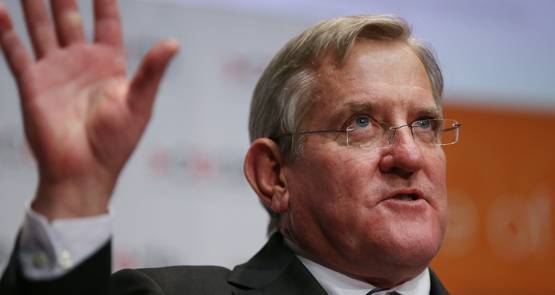
As if the fissures in his own party weren’t enough, Malcolm Turnbull is confronting dangerous new tensions in the relationship between the two coalition partners.
At issue is the proposed move from the Liberals to the Nationals by Ian Macfarlane, member for the Toowoomba-based seat of Groom, who was dumped from the ministry by Turnbull in September, despite having supported him in the leadership challenge.
While Macfarlane appeared to take this on the chin at the time, his plan to switch allegiance appears calculated to bring him back into cabinet, since the resulting change in party numbers would grant the Nationals an extra position under the formulas that govern the coalition agreement.
For those who remain outraged by Tony Abbott’s demise, talk of defections from the Liberal Party raises the intriguing possibility that the Nationals will become a lightning rod for conservative disaffection with Turnbull — perhaps ultimately to the extent of causing his prime ministership to founder on his incapacity to smooth over the cracks between the coalition parties.
It is perhaps too much to ask, as the AFR‘s Laura Tingle mischievously suggested on the ABC’s Insiders last week, that Abbott might impose himself on Turnbull as deputy prime minister by joining the Nationals and taking on the leadership.
But there have at least been suggestions that another Queensland MP, Scott Buchholz, could follow in Macfarlane’s footsteps.
Not everyone in the Nationals is viewing such prospects with relish, given the threat they entail to the government’s stability and longevity.
Macfarlane’s defection has met opposition from Queensland Nationals stalwarts including Bruce McIver, who recently ended a seven-year tenure as president of the Liberal National Party, and Lawrence Springborg, the state Opposition Leader.
However, there is another strand of the party that likes the sound of a more assertive approach, exemplified by Barnaby Joyce, who was one of the architects of Macfarlane’s defection.
Tension between coalitionist and independent tendencies is as old as the National Party itself, and it might well be thought that a swing of the pendulum from the former to the latter is overdue, given that the party appears to have arrested its pattern of long-term decline in recent years.
Conventional wisdom had long held that rural Australia’s diminishing share of the national population was condemning the Nationals to long-term irrelevance, which appeared to be borne out when the party’s share of the seats in the federal Parliament fell by nearly half between the mid-1970s and the late 1990s.
However, since the turn of the current century, the Nationals have stabilised their share of seats and votes, held off determined challenges from Liberal candidates in seats where their sitting members have retired, and undergone a renaissance at state level in Western Australia.
As Macfarlane’s move demonstrates, the party also retains a distinct life of its own in Queensland, despite the awkward fact that it doesn’t technically exist there.
When Queensland’s Liberal National Party merger was effected in 2008, it was done as a solution to a state-level problem, following three successive drubbings for the Coalition at the hands of Labor under the leadership of Peter Beattie.
Voters in the state’s booming south-eastern corner had proved unwilling to countenance a government headed by the Nationals, who remained the senior partner in the Coalition despite having lost their Joh-era footholds in Brisbane and the Gold Coast.
Federal Coalition members in Queensland have since been part of a united party organisation that runs their campaigns and determines their preselections, but once in Canberra they face the unavoidable question of which of the two party rooms they are assigned to.
The division of the spoils is inevitably a matter of finely balanced compromise, since there is no allowance for voters to make their own choice between competing Liberal and Nationals candidates at an election, as would be the case in any other state.
The current numbers favour the Queensland Liberals over the Nationals by 16 to six in the House of Representatives, although all but one of the Nationals’ seats is securely held, whereas five of the Liberal seats are on precarious margins of less than 6%.
Since Macfarlane’s seat of Groom is one of the safe ones, its loss to the Liberals would be felt particularly keenly.
The delicacy of the matter is emphasised by moves to have the LNP’s state executive block the Macfarlane switch when it meets today, together with proposed changes to party rules to prevent any similar defections in future, as reported today in The Australian.
The situation shows every indication of getting even messier on a number of fronts, with Turnbull reportedly indicating that he will delay giving effect to a claim by the Nationals to an extra place in cabinet, and resist any move to make Macfarlane the beneficiary if that’s what transpires.








A divided LNP that cannot govern itself, can’t possibly hope to govern the country effectively!
If they win the next election, we are in for more harrowing times. Just another ‘rAbbott’ government with a different so-called leader!!
Quite a few words, Mr Bowes, when all you needed to was to concede you’re clutching at any straw, even those which may be imaginary.
Meanwhile back at the ranch…
the governance of the country can go to hell while the politicians fight their own turf war.
The Nation be buggered.
Norman. Why aren’t you contributing to Piers Akerman’s blog. Join the crazies
That would suit you better.
“When you say ‘Barnaby Joyce – Deputy Prime Minister and Chook Raffles’ you’ve said it all!”